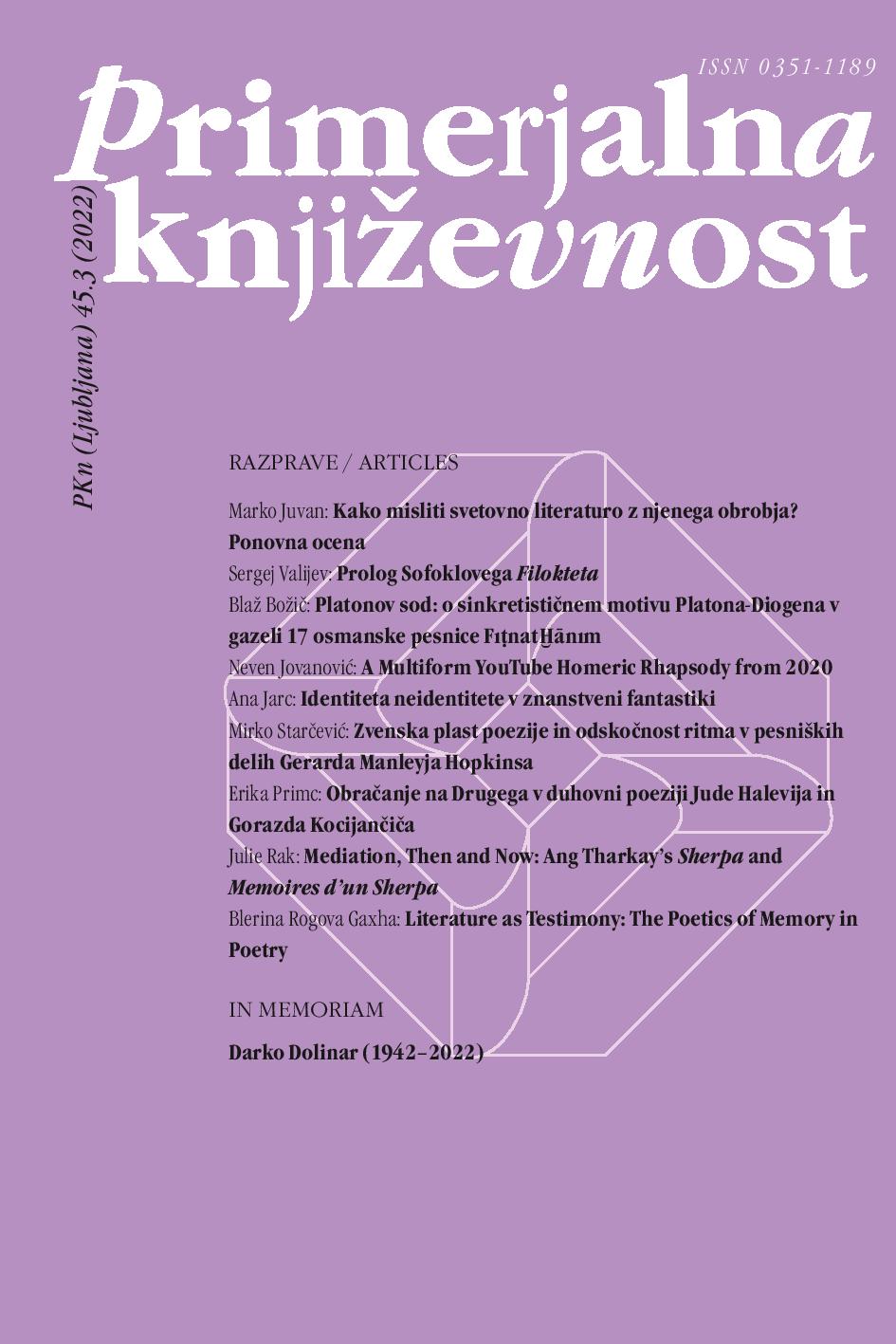The Prologue of Sophocles’ Philoctetes
DOI:
https://doi.org/10.3986/pkn.v45.i3.02Keywords:
Greek tragedy, Sophocles: Philoctetes, literary characters, Neoptolemus, Odysseus, ephebeAbstract
The present article discusses in detail the prologue of Sophocles’ tragedy Philoctetes. It points out the innovations in the Sophocles’ dramatic representation of the Philoctetes’ story, i.e. the introduction of the new dramatic character of Neoptolemus and the modification regarding the place of the action, the isle of Lemnos in Sophocles’ drama being uninhabited. The prologue plays informative as well as dramatic role. On the one hand, it makes us acquainted with the dramatic characters and the basic traits of the dramatic action, on the other hand, the prologue is by itself an inseparable part of the dramatic action. Thus, here becomes manifest the theme of human nature, phýsis, which will later serve as a crucial axis of dramatic action. In the name of his nature, Neoptolemus reacts disapprovingly to Odysseus’ order to get in possession of the Philoctetes’ bow by guile. Having predicted this kind of reaction, Odysseus prevails over Neoptolemus’ concerns by fostering his ambition with the promise of his future glory as conqueror of Troy. It is for this motive that, at the end of the prologue, Neoptolemus is willing to fulfil Odysseus’ order, even though conscious of acting against his own nature. The Neoptolemus’ experience of Philoctetes’ suffering will later provide him with a deeper confrontation with a human nature in general and his own in particular. In this experience, the frame of the dramatic action as set in the prologue will break up and the denouement will proceed by the ways unimaginable and unpredictable in the prologue.
References
Pucci, Pietro, kom. in uvod. <em>Sofocle: Filottete</em>. Priprava besedila Guido Avezzù. Prev. Giovanni Cerri. Milano: Fondazione Lorenzo Valla, Arnoldo Mondadori Editore, 2003.
Budelmann, Felix. <em>The Language of Sophocles: Communality, Communication and Involvement</em>. Cambridge: Cambridge University Press, 2000.
Cassirer, Ernst. <em>Philosophie der symbolischen Formen: das mytische Denken</em>. 2. zv. Hamburg: Meiner, 2010.
Gill, Christopher. »The Character–Personality Distinction«. <em>Characterization and Individuality in Greek Literature</em>. Ur. Christopher Pelling. Oxford: Clarendon Press, 1990. 1–31.
Goldhill, Simon. »The Audience of Athenian Tragedy«. <em>The Cambridge Companion to Greek Tragedy</em>. Ur. Patricia E. Easterling. Cambridge: Cambridge University Press, 1997. 54–68.
Goldhill, Simon. »The Great Dionysia and the Civic Ideology«. <em>Nothing to Do with Dionysos? Athenian Drama in Its Social Context</em>. Ur. John J. Winkler in Froma I. Zeitlin. Princeton, NJ: Princeton University Press, 1992. 97–129.
Hulton, Angus O. »The Prologues of Sophocles«. <em>Greece & Rome</em> 16.1 (1969): 49–59.
Iser, Wolfgang. <em>Bralno dejanje: teorija estetskega učinka</em>. Prev. Alfred Leskovec. Ljubljana: Studia humanitatis, 2001.
Kamerbeek, Jan Coenraad. <em>The Plays of Sophocles: Commentaries. Part VI: The Philoctetes</em>. Leiden: Brill, 1980.
Knox, Bernard M. W. <em>The Heroic Temper: Studies in Sophoclean Tragedy</em>. Berkeley, CA: University of California Press, 1964.
Lesky, Albin. <em>Die tragische Dichtung der Hellenen</em>. Göttingen: Vandenhoeck & Ruprecht, 1972.
Manuwald, Bernd, kom. in prev. <em>Sophokles: Philoktet</em>. Berlin; Boston, MA: De Gruyter, 2018.
Parlavantza-Friedrich, Ursula. <em>Täuschungsszenen in den Tragödien des Sophokles</em>. Berlin; Boston, MA: De Gruyter, 1969.
Perrotta, Gennaro. <em>Sofocle</em>. Messina; Milano: Casa Editrice Giuseppe Principato, 1935.
Reinhardt, Karl. <em>Sophokles</em>. Frankfurt ob Majni: Klostermann, 1947.
Reinmuth, Oscar W. »The Ephebate and Citizenship in Attica«. <em>Transactions and Proceedings of the American Philological Association</em> 79 (1948): 211–231.
Reinmuth, Oscar W. »The Genesis of the Athenian Ephebia«. <em>Transactions and Proceedings of the American Philological Association</em> 83 (1952): 34–50.
Schadewaldt, Wolfgang. <em>Monolog und Selbstgespräch: Untersuchungen zur Formgeschichte der griechischen Tragödie</em>. Berlin: Weidmannsche Buchhandlung, 1926.
Schlesinger, Eilhard. »Die Intrige im Aufbau von Sophokles’ Philoktet«. <em>Rheinisches Museum für Philologie</em> 111.2 (1968): 97–156.
Segal, Charles. <em>Tragedy and Civilization: An Interpretation of Sophocles</em>. Norman, OK: University of Oklahoma Press, 1999.
Senegačnik, Brane, in Sergej Valijev. »Eksistenca literarnih likov in neverbalna motivacija v Sofoklovi tragediji«. <em>Clotho</em> 4.1 (2022): 5–28.
Senegačnik, Branko. »Content-based and Extratextual Reasons Arguing for a Psychological Approach to Sophocles’ <em>Antigone</em>«. <em>Živa antika</em> 58.1–2 (2008): 11–34.
Siewert, Peter. »The Ephebic Oath in Fifth-Century Athens«. <em>The Journal of Hellenic Studies</em> 97 (1977): 102–111.
Sofokles. <em>Ajant. Trahinke. Filoktet</em>. Prev. Kajetan Gantar in Brane Senegačnik. Maribor: Založba Obzorja, 2000.
Taylor, John Wilson. »The Athenian Ephebic Oath«. <em>The Classical Journal</em> 13.7 (1918): 495–501.
Vernant, Jean-Pierre, in Pierre Vidal-Naquet. <em>Mythe et tragédie en Grèce ancienne</em>. Pariz: François Maspero, 1977.
Vidal-Naquet, Pierre. »Le Philoctète de Sophocle et l’éphébie«. <em>Annales. Histoire, Sciences Sociales</em> 26.3–4 (1971): 623–638.
Winnington-Ingram, Reginald P. <em>Sophocles: An Interpretation</em>. Cambridge: Cambridge University Press, 1980.


